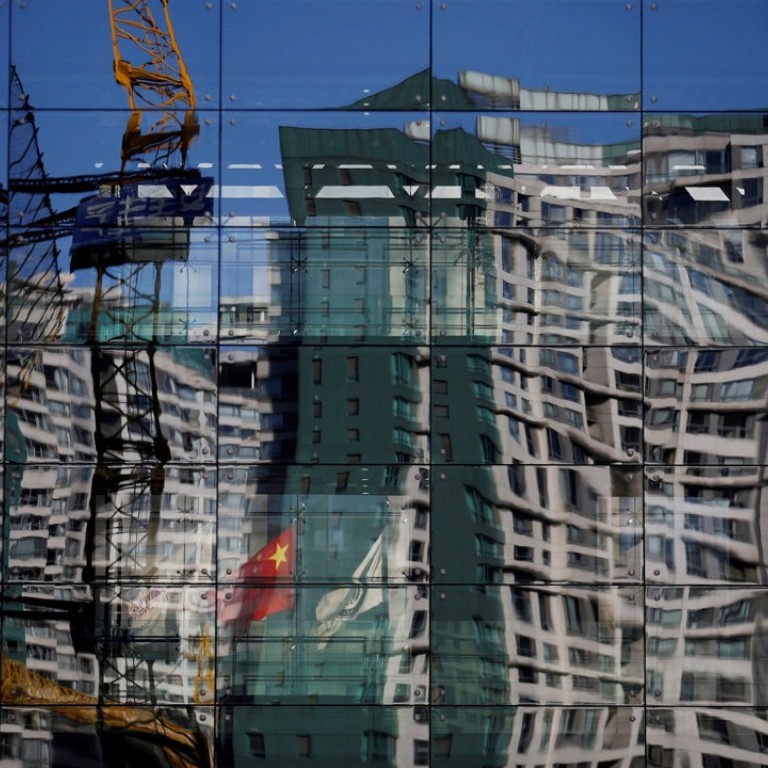
Public anger in China spreading as property prices drop
Sales are usually brisk at this time of year, but so far the figures are grim – and people who’ve already bought are protesting against price cuts
Chinese property developers can usually count on September and October to be their “gold and silver” months for sales, but this year turned out to be different.
Not only were their sales figures grim for September, but the seven-day national holiday last week also brought at least two fangnao incidents – when homeowners protest against price cuts offered by developers to new buyers.
These protests are often directed at sales offices, with varying levels of intensity – from throwing rocks to holding banners and putting up funeral wreaths. As home ownership has remained the most important channel of investment for urban households in China in the past decade, price cuts have become increasingly unacceptable and a cause for social unrest.
In eastern Jiangxi province last week, angry homeowners who paid full price for units at the Xinzhou Mansion residential project in Shangrao attacked the Country Garden sales office after finding out it had offered discounts to new buyers of up to 30 per cent.
A similar incident took place in suburban Shanghai, where the same developer slashed prices at another project called One Mansion by a quarter.
Chinese homebuyers vent rage at Country Garden for slashing prices at two residential developments by up to 30 per cent
“Property accounts for roughly 70 per cent of urban Chinese families’ total assets – a home is both wealth and status. People don’t want prices to increase too fast, but they don’t want them to fall too quickly either,” said Shao Yu, chief economist at Oriental Securities.

China’s property market has soared since the 2000s, making home ownership the quickest way to gain wealth. In Beijing, homes that went for an average of around 4,000 yuan (US$580) per square metre in 2003 are now above 60,000 yuan (US$8,600) a square metre, according to property price data provider creprice.cn.
“People are so used to rising prices that it never occurred to them that they can fall too. We shouldn’t add to this illusion,” Shao said.
The government has been working on measures to cool property prices for years, calling residential real estate not only an economic issue but also “an important issue for people’s livelihoods that influences social stability”, in a directive back in 2010.
The industry has remained strong in the first eight months of the year but started slowing last month, according to data provider China Real Estate Information Corp. Official statistics showed that in Shangrao, where the violent protest occurred, transactions of homes last month fell by 22 per cent from August and 18 per cent from the same month last year.
In Shanghai, sales in the past five weeks have risen slightly from the same period last year, but average prices dropped in September by over 3 per cent from August and 1.4 per cent from the same period last year.
Zhang Dawei, chief analyst at Centaline Property, warned that not only were the overall sales dropping, but poor construction quality could also be a cause for more violence. “Try not to buy homes built in 2018, because while the developers were short of money, the same is the case with contractors,” he said.
“The fourth quarter would be a peak time for residential project completion. Issues which used to be papered over by rising prices could erupt in this period… so we should look out for a sudden surge of fangnao in the coming months,” he said.
Country Garden shares slump to 14-month low after angry homebuyers storm sales centre to protest price cuts
Hu Xingdou, a Beijing-based economist, said despite China’s market-oriented reforms 40 years ago, investors still lacked respect for market and social rules.
“They don’t have the spirit of contract, and they always think they can fight against the rules,” he said. “As a commodity, the value of homes can both rise and fall. Investors should obey this fundamental rule.”
Rampaging against price cuts was first seen in 2011, when homebuyers of a residential project named Oriental Rose in Beijing’s Tongzhou district mobbed a Huaye sales office after the firm cut prices by a tenth.
Similar incidents have erupted whenever investors have found their property value depreciating. In a country where there are relatively fewer investment channels and an unpredictable stock market, such protests are always couched as a struggle to protect individual rights.
In many such cases, protesters demand compensation or cancellation of their purchase, and in order to prevent further social disorder, developers often accept their demands.
Wang Cailiang, director of the Beijing Cailiang Law Firm, said although fangnao was against the law, the government had tolerated such protests because it was ultimately responsible for the surging prices.
“It was the government that pushed up the prices by profiting from selling land to developers in the past two decades,” he said. “Now public anger over home prices has become a major social issue.”
Chinese developers set for disappointing October as cash discounts fail to spur Golden Week sales
Economist Shao expected average home prices to drop slightly in the coming months as the government continued efforts to control them. At a meeting of the Communist Party’s Politburo in late July, top officials reiterated that “containing home price gains” would be a priority in the second half of the year.
In the first two weeks of September, growth was close to stagnating in 40 major cities across the mainland with the total number of new home sales up by just 1 per cent from the previous month, according to China Real Estate Information Corp data.

